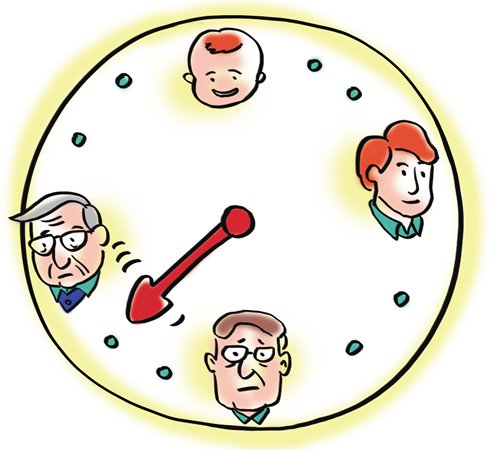
Illustration: Liu Rui/GT
When people forwarded me a Chinese newspaper article published by the Senior Daily in October, I was confused at first. Flashed a headline "The focus of senior life? People born in the 1970s say freedom. People born in the 1960s say health." The story talked about the future life priorities of different generations. So what? I was thinking. It was only after receiving such customized news several times from friends in my WeChat contacts that I noticed the emoji of chuckling coming with every delivery that was attached deliberately by the sender. Then I suddenly realized it was supposed to be a jab at someone born in the 1970s like me as my generation and the word "senior" became associated.
Not that I have never been exposed to jokes about aging. The latest dose came on November 13 when comedian Jimmy Kimmel celebrated his birthday in his late night show Jimmy Kimmel Live, and his celebrity friends showed up one after another to joke about his age.
Adam Sandler, 1 year older, told Kimmel, who was seated on a flamboyant birthday chair, to feel free to loosen his belt.
"Remember how we used to get embarrassed when our dads would unbutton the top button of their pants at the dinner table? Well, turns out they were geniuses," and Ray Romano, who is several years older, elaborated some plights for older men that cannot be repeated in this kind of paper, and gave Kimmel a T-shirt with the print: "Everything hurts."
But Kimmel is not my generation. He turned 50 that day, basically the threshold for safe aging jokes in the US.
When it happens earlier than that, it can ignite a public feud. In 2013 at Comedy Central's roast of James Franco, Jonah Hill quipped about the then 42-year-old Sarah Silverman, "Everyone's like, 'She's hot for a comic.' I don't agree. She's not just hot for a comic. She's hot for someone her age." Silverman, who normally has a high tolerance for mean jokes, didn't take it well. She shared her pain in W Kamau Bell's show Totally Biased afterward: "Me being old, first of all, at the roast? - completely took me by surprise… I feel like your joke is that I'm still alive. My crime is not dying."
But these jokes are like a tender massage compared to the sharp age-themed jokes ubiquitous on talk show programs in China.
Take Roast Convention, an online show similar to the Comedy Central version, that has gone viral since its launch last summer. Age jokes are not only a staple of the roasters, but are also crueler and smeared across a broader range of targets. For example, in one episode, Sha Baoliang, an acrobat-turned singer, bashed Qu Ying, a model-turned actress when he said he told the producers that he started his career in the entertainment field at the same time as Qu. He said the producers were all astonished. "They said to me, we should have respected you more if we knew you were so old," Sha boasted.
And in another episode, Cai Guoqing, a pop singer who was an icon in the 1990s, was slammed by Chi Zi for hanging around the pop music field too long. "You were leading the field then and are dragging it now," said the 21-year-old stand-up comedian. "We'd appreciate if you consider dropping off because Chinese pop music has been slowing itself down to wait for you."
Qu and Cai are in their late 40s.
This may reflect some cultural differences when it comes to ages and aging between Chinese and Americans. A recent survey by the US Trust found that in the US Millennial generation think old age begins at 59, Gen Xers think the milestone is 65, and boomers and the silent generation all think you are not in old age before you turn 73. But in China, the majority of people between 45 and 54 think they are old, and 65 percent think old age strikes before 60, according to a 2010 survey by the UK-based healthcare group Bupa. The results were reaffirmed by a 2016 survey by Cigna that found Chinese consider 60 the starting point of old age, much lower than many Western countries.
Maybe China's harsh perspective on age helps prompt so many brutal jokes. But the jokes are not so innocent. They could help reinforce such perspectives. If applying age jokes to people who are not so old raise eyebrows in a country like the US where the Age Discrimination in Employment Act has been in place for half a century, it will be more dangerous in China, where such a law is not established.


